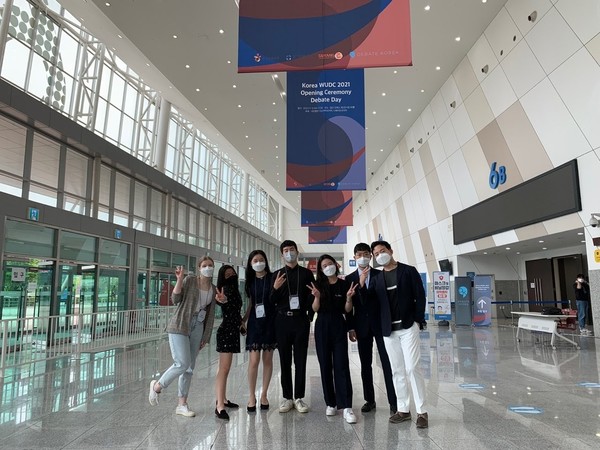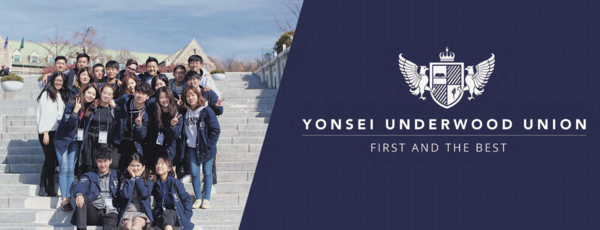“The first and the best”

A TOWERING figure in South Korea’s debating community, the Yonsei Underwood Union is South Korea’s oldest English debating society. Founded in 2006 by a few students of the newly established Underwood International College, the club has developed into a multinational debate powerhouse. The club has won the Korea National Championships, judged at the Northeast Asian Debate Opens, hosted the Cornell-Yonsei Debate Invitationals, and qualified for the World Universities Debating Championship—the only debating society in South Korea to do so. With dedication and camaraderie as their core values, the Yonsei Underwood Union hopes to nurture open-minded, intelligent leaders of tomorrow one debate at a time. To learn more about the club, The Yonsei Annals met with Lee Dong-bin (Jr., UIC, Economics), the president of the Yonsei Underwood Union.
Annals: Could you briefly introduce the Yonsei Underwood Union?
Lee: The Yonsei Underwood Union is Yonsei University’s only English debate club and is a member institution of the Korea Intervarsity Debate Association. Founded in 2006, the Yonsei Underwood Union is one of the best debate clubs not only in South Korea but also in the Northeast Asian debating circuit. However, we are not just a nerdy academic society. We party hard; we are a friend group and a family. The Yonsei Underwood Union loves getting to know new people, going to parties and retreats, and even grabbing dinner together. Our official motto is “first and the best,” but we also go by “clever debaters of the day, hard drinkers of the night.”
Annals: How is the club organized?
Lee: Although affiliated with the Underwood International College, the Yonsei Underwood Union is open to all members of Yonsei University, including foreign exchange students. We are a multiethnic and multicultural organization and the club’s diverse foundation is our source of joy and pride. Under the leadership of our faculty editor, Professor Michael Hope (Prof., Underwood International College), the club is led by an elected president and vice-president, both of whom are supported by the Council, a group of senior debaters who provide feedback on all decision-making processes. Our club recruits new members at the beginning of every semester.
Annals: What does a normal week at the Yonsei Underwood Union look like?
Lee: The Yonsei Underwood Union began as a few people meeting up inside empty classrooms after lectures to conduct sessions, or rounds of debate, practice English speaking, and give feedback to each other. While much has changed about the club over the past decade, these sessions continue to remain at the core of the Yonsei Underwood Union.
Every Tuesday and Thursday, all members of the club gather at Daewoo Annex Hall for sessions, accompanied by club announcements on upcoming tournaments. During sessions, debaters are divided up into teams of two or three, depending on the semester[1], to debate on an on-the-spot motion with 15 minutes of preparation time. Debate topics range from religion, feminism, the justice system, to international relations, and require deep knowledge of current affairs. Judges, who consist of senior debaters, are accompanied by new judges known as “trainees,” and they listen to the seven-minute speeches made by each member representing either the government or opposition and take meticulous notes of each statement. It is a careful process of weighing the arguments and impacts of each statement. After the speakers conclude their speeches, the judges move into a separate room to deliberate the results and then give their verdict on the debate while providing reasons for their adjudication. The process goes on for one or two more rounds until all the members are exhausted and the session wraps up.
Annals: The club’s routine seems rigorous. Is there anything else that the club does other than debating?
Lee: Apart from debating, we also conduct matter case studies, which is a process of analyzing case studies on global issues and principle ideologies that express a spectrum of ideals upon which society should work. On special occasions, alumni members of the debating community join our sessions to give lectures on debate material. All members of our debating circuit share a family-like bond and try to look out for and help each other as much as possible. Just last month, a former member of the Yonsei Underwood Union, who now works in one of South Korea’s largest financial investment firms, came to a session on a busy Thursday night to give a lecture on macroeconomics. The lecture ended up turning into a debate about Keynesian redistribution and social justice, offering a free and unfiltered exchange of thoughts between members.

Annals: You also mentioned that the club was about meeting new people and having fun.
Lee: Yonsei Underwood Union sessions always end with a couple of drinks. After exhausting rounds of debate, members of the club are usually famished, so we eat dinner at an all-you-can-eat restaurant. We always have a good time at these afterparties, taking a load off our busy debating and student lives. Interaction between members is also extremely fluid and intimate—relationships formed during these gatherings are essential to the grit and hard work of the Yonsei Underwood Union’s hardworking debaters. We are a family.
Annals: I understand that the Yonsei Underwood Union competes at the highest echelons of debating competitions.
Lee: A core objective of the Yonsei Underwood Union is to compete and win in debating competitions. The club participates in the Korean National Championships every year, in addition to competing in international tournaments such as the Oxford IV and Northeast Asia Debate Championships. This year, the Yonsei Underwood Union sent four teams to the Korea National Championships and won the Open Grand Finals of this year’s tournament. Normally, debate competitions consist of seven rounds of debating over three days, which is extremely tiring. The club tries its best to support debaters, using club funds to rent study-rooms, accommodation, and transportation.
Debating competitions teach individuals to be more open-minded and logical. As debaters cannot choose which side of the aisle they debate on, debating on either side of various themes widens the members’ scope of view.
Annals: Does the Yonsei Underwood Union also host competitions?
Lee: The Yonsei Underwood Union hosts one-day debating tournaments called the YUU Monthly, which invites teams across South Korea for four rounds of intense debate. When the free-of-charge competition first came out, it changed the paradigm of the debating community. Debating competitions tend to be financially burdensome for many as participants must pay for registration, travel, lodging, and food for the duration of the competition. The YUU Monthly lowers the barriers to entry for debating considerably and has helped create a free discourse among debaters. Rookie debaters can freely form teams and come to YUU Monthly, and since the tournament is hosted for only one day on a Saturday, senior debaters and busy alumni members have more time to team up with less-experienced debaters and guide them.
Annals: What are some of the future goals of the Yonsei Underwood Union?
Lee: The Yonsei Underwood Union hopes to uphold the high standards of debate and open discourse set by our debaters. We also hope to successfully transition offline from the COVID-19-affected semester, which has converted most of our sessions and competitions online. While numerous other challenges lie ahead, the Yonsei Underwood Union will count on its members to pave the way for our club in the years to come. YUU, the first and the best!
[1] In the spring semester, the Yonsei Underwood Union follows the three-person Asian Parliamentary style of debating, while it follows the two-person British Parliamentary styles during the fall semester.

